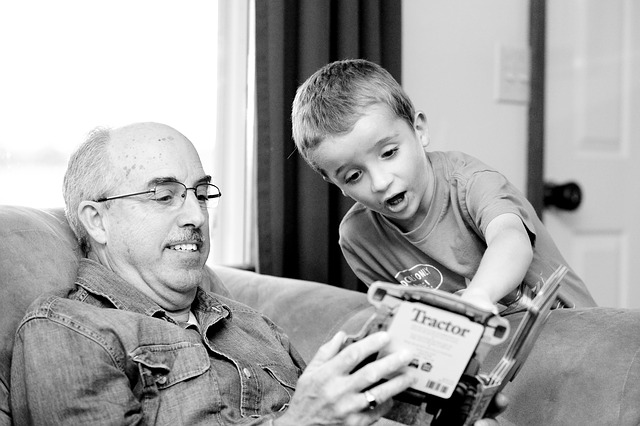 Photo taken from Pixabay
Photo taken from Pixabay
National Grandparents Day was initiated at the grassroots level by West Virginian Marian Lucille Herndon McQuade, with the behind-the-scenes support of her husband Joseph L. McQuade. They had 15 children, 43 grandchildren, 10 great-grandchildren, and one great-great grandchild.
Mrs. McQuade started her campaign for a day to honor grandparents in 1970. She worked with civic, business, church, and political leaders to first launch the day in her home state in 1973. Formally codified by Governor Arch Moore of West Virginia on May 27, 1973, this holiday gives us an opportunity to pay tribute to our wisest members. After many years, much persuasion, and unending persistence, she finally achieved her bigger goal. In 1979, President Jimmy Carter proclaimed the first Sunday after Labor Day each year as National Grandparents Day. The month of September was chosen to signify the “autumn” years of life. Some people credit Hermine Beckett Hanna as originating the Grandparents Day idea with her work spreading awareness of the importance of seniors to society as early 1961. Mrs. Hanna was recognized in 1990 by Congressman James Walsh of New York for her work and dedication to grandparents.
Mrs. McQuade established the holiday for 3 reasons:
- To honor grandparents;
- To give grandparents an opportunity to show love for their children’s children; and
- Help children become aware of the strength, information, and guidance older people offer.
My parents have seven children, 12 grandchildren, and 3 great-grandchildren. The value of annually celebrating those precious individuals who have a grand impact in our lives is priceless. A fun part may be choosing how to show your gratitude in your own way.
Because this holiday isn’t as well known as it could be, we feel it deserves more recognition. Here are 3 reasons why we believe this day is so important, and 4 ideas on how to make this day extra special.
The Why
- Learn about the past. Grandparents and other elderly people in your life have a lifetime of experiences and stories. Learn about the challenges and triumphs of those several generations before you from stories they share.
- Solve problems in the present. Connecting adults and the youth and opening the dialogue between young and old is vital to figuring out the present. Your grandparents or elderly friends may surprise you with the perspective they can bring to your current life situation, no matter how different it may feel from generations before you. Encourage them to share their values, knowledge and points of view. A bit of wisdom of old can have a massive impact on the present
- Envision the future. Together, adults and youth can take on one of the most important dialogues in our history: discussing how, as a country and world, we can address the many challenges facing future generations—from education and environment to health to and financial stability. The combination of wisdom, creativity and dialogue will most certainly improve the quality of life for future generations.
The How
- Have a grandparent date. Set up an outing with your grandparents. Go to a park, chat on the couch, or make a nice meal. Having bonding time as a grandparent and grandchild is a precious opportunity to listen and learn from one another.
- Honor those past. If your grandparents have passed on, hold an in memoriam ceremony as a heartfelt way to celebrate the good times spent together. Invite other friends or family, light candles, bring out the photos and share stories together to honor their life, impact and achievements.
- Create a memory. Create a storybook or photo album to journey through their life. Make it as a gift for your grandparents or for friends or family that hold their memory to lock in their life’s story.
- Give a gift. Give a small gift such as a painted picture, a simple letter, or a favorite sweet. Never underestimate the power of a personal gift – as they say, it’s the thought that counts.
Taking the time to commemorate the people in your life you respect the most can mean the world to them. How do you celebrate National Grandparents Day? Send us a note and let us know!
“You should live in a way where you look back at age 80 to a life fulfilled with meaning and love”
-Carl Raglin.
Sharon Schweitzer, Sophie Echeverry and Vienna Raglin co-wrote this post. Sharon Schweitzer, J.D., is a cross-cultural trainer, modern manners expert, and the founder of Access to Culture. In addition to her accreditation in intercultural management from the HOFSTEDE centre, she serves as a Chinese Ceremonial Dining Etiquette Specialist in the documentary series Confucius was a Foodie, on Nat Geo People. She is the resident etiquette expert on two popular lifestyle shows: ABC Tampa Bay’s Morning Blend and CBS Austin’s We Are Austin. She is regularly quoted by BBC Capital, Investor’s Business Daily, Fortune, and the National Business Journals. Her Amazon #1 Best Selling book in International Business, Access to Asia: Your Multicultural Business Guide, now in its third printing, was named to Kirkus Reviews’ Best Books of 2015. She’s a winner of the British Airways International Trade Award at the 2016 Greater Austin Business Awards and the 2017 New York City Big Book Award for Multicultural Nonfiction.
Vienna Raglin is the Marketing and Sales Manager at Access to Culture. With a professional background in Sales and Hospitality, she earned a BBA in Marketing and Sales from Texas State
Sophie Echeverry is the corporate marketing manager and event coordinator at Access to Culture. Born and raised in Colombia, she’s a 2018 graduate with a B.B.A. in International Business and Marketing from Hult International Business School in San Francisco, CA. Connect with her on LinkedIn.

Leave A Comment